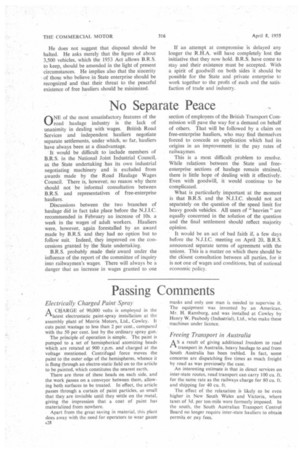No Separate Peace
Page 30

If you've noticed an error in this article please click here to report it so we can fix it.
ONE of the most unsatisfactory features of the 1,—/road haulage industry is the lack of unanimity in dealing with wages. British Road Services and independent hauliers negotiate separate settlements, under which, so far, hauliers have always been at a disadvantage.
It would be difficult to include members of B.R.S. in the National Joint Industrial Council, as the State undertaking has its own industrial negotiating machinery and is excluded from awards made by the Road Haulage Wages Council. There is, however, no reason why there should not be informal consultation between B.R.S. and representatives of free-enterprise hauliers.
Discussions between the two branches of haulage did in fact take place before the N.J.I.C. recommended in February an increase of 10s. a week in the wages of adult workers_ Hauliers were, however, again forestalled by an award made by B.R.S. and they had no option but to follow suit. Indeed, they improved on the concessions granted by the State undertaking.
B.R.S. probably made their award under the influence of the report of the committee of inquiry into railwaymen's wages. There will always be a danger that an increase in wages granted to one section of employees of the British Transport Commission will pave the way for a demand on behalf of others. That will be followed by a claim on free-enterprise hauliers, who may find themselves forced to concede an application which had its origins in an improvement in the pay rates of railwaymen.
This is a most difficult problem to resolve. While relations between the State and freeenterprise sections of haulage remain strained, there is little hope of dealing with it effectively. Even with goodwill, it would continue to be complicated.
What is particularly important at the moment is that B.R.S. and the N.I.I.C. should not act separately on the question of the speed limit for heavy goods vehicles. All users of " heavies " are equally concerned in the solution of the question and the final settlement should reflect majority opinion.
It would be an act of bad faith if, a few days before the N.J.I.C. meeting on April 20, B.R.S. announced separate terms of agreement with the unions. This is a matter on which there should be the closest consultation between all parties, for it is not one of wages and conditions, but of national economic policy.




























































































